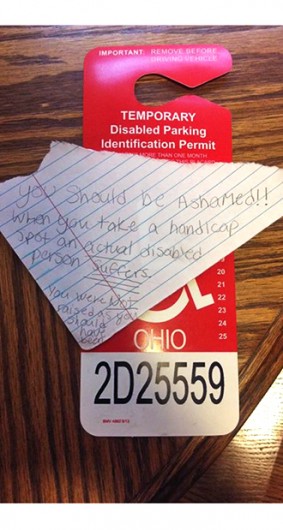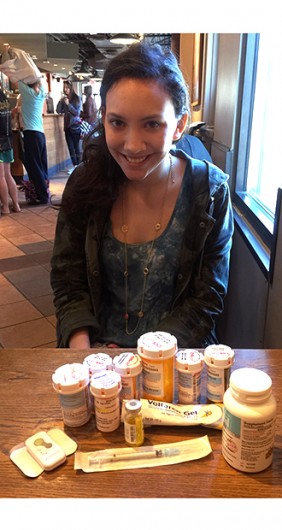
Harley Skorpenske, an OSU student diagnosed with lupus, found a note affixed to her windshield after parking in a handicapped space last Thursday. Credit: Courtesy of Harley Skorpenske
Ohio State student Harley Skorpenske walked out to the CVS parking lot on Thursday morning to see a stranger placing a note on her car.
After quickly making eye contact with Skorpenske and exchanging a friendly smile, the stranger shuffled away as she approached her car. At first, Skorpenske said she assumed the note was a club invitation or a coupon, but was surprised with the content of the note, which stated: “You should be ashamed!! When you take a handicap spot an actual disabled person suffers. You were not raised as you should have been.”
Skorpenske, a third-year in evolution, ecology, and organismal biology, was diagnosed with lupus in 2012, which means her immune system consistently attacks her healthy tissues, organs and joints.
Lupus is a chronic autoimmune disease that causes the body’s autoantibodies to attack and destroy healthy tissue. The symptoms of the disease fluctuate, which can lead to an individual experiencing periods of “flares” and “remissions,” according to the Lupus Foundation of America’s website.
For the past four years, Skorpenske said her body has been consumed by rashes and constant pain. During her sophomore year, lupus ate away at the nerve that connects her ear to her brain, causing her permanent hearing damage.
Because of all of the damage caused by lupus, Skorpenske said she regularly visits seven doctors and a physical therapist and takes 16 pills each day. She also has to self-administer a shot of chemo every week.
But Skorpenske said the note from the stranger did not ruin her day.
“It’s just as simple as getting stuck in traffic or it’s raining,” she said.
While the note didn’t make her upset, it did anger Corinna Skorpenske, Harley’s mother.
“She actually has a disability, and I just wanted the person to understand that,” Corinna Skorpenske said. “That’s why she had a handicap parking sticker; it wasn’t just somebody who was borrowing someone else’s car and parked there.”
According to the Lupus Foundation of America, there are at least 1.5 million people in the United States who are diagnosed with lupus.
Lupus is a considered an “invisible illness,” a term that’s commonly used in the medical world to describe those who suffer from chronic diseases and appear to be healthy when they actually aren’t.
But Harley Skorpenske is not the only student on campus who suffers from an invisible illness.
“There are currently 1,850 students registered as having disabilities in the Office of Student Life Disability Services. Of that number, 88 percent have hidden or invisible disabilities that include, but are not limited to learning, attention deficit disorders, medical and mental health conditions,” said Lois Harris, the director of the Office of Student Life Disability Services, in an email.
Harley Skorpenske said the parking lot incident is something that’s common in the invisible illness community.
“I think it’s really difficult to conceptualize that somebody can have such a severe disability that they can’t walk that distance,” she said. “I try to be understanding of people that don’t have someone in their life with an invisible disability. I really want to protect what she (the stranger in CVS parking lot) did because I think what she did had great intentions. I applaud her for advocating for the people that have wheelchairs or crutches that also need those spots.”
But Corinna Skorpenske said she wished she could have confronted the bystander and talked to her. After finding words to describe her anger, Corinna Skorpenske channeled that anger into a post on Facebook.
“I decided to use this opportunity to make it a positive rather than a negative,” Corinna Skorpenske said.
In a post titled “To the person who left this on my daughter’s car,” Corinna Skorpenske said her daughter had been diagnosed with lupus when she was 16 years old, and explained the struggles her daughter has endured. She also shared her daughter’s collegiate journey with lupus, starting chemotherapy her freshman year, beginning to lose her hearing her sophomore year and having her lung collapse three times during her junior year, causing her to take time off from school.
The message was posted online on April 9 and had more than 184,000 shares as of Wednesday night. Both Harley and Corinne Skorpenske’s Facebook walls have been filled with support from the invisible illness community and from those who appreciated a mother standing up for her daughter.
Harley Skorpenske said she is proud of her mother for using social media to share her message.
“I think parents are really protective and she had the chance to put something really mean and equally attacking on Facebook,” Harley Skorpenske said. “I think she was able to make it an opportunity to teach someone something they didn’t know.”
Corinna Skorpenske said she is just as proud of her daughter and how she has attempted to raise awareness for her disease.
“She’s very passionate about bringing awareness to these ghost diseases,” Corinna Skorpenske said. “I kind of think that if she has this disability, then there’s no excuse for any of us.”



